Browse the interviews
Sorted by interview reference
VN025 Nesta Davies, Unilateral Capacitors, Wrexham;Filmcap (Hunts capacitors), Wrexham;Johnson's Fabrics, Wrexham
After leaving school, Nesta worked in a bakery, icing cakes and cleaning tables but the money wasn't very good and she had to catch the bus into Wrexham. After that, she worked in a launderette in Llangollen, washing sheets for hotels, and they had to carry heavy sheets and put them in the rollers. She found it very hard work and couldn't cope and after about six weeks she heard about a job in a factory at Llangollen, which wove wool blankets. She started work in 1946; she was three years in the blanket factory, and went to the sanitary towel factory at seventeen. She said the sanitary towel factory and Johnson Fabrics were in Marchwiel, which is now Wrexham industrial estate. She met her husband in Johnsons Fabrics. He used to clean the fluff off all the looms. Julie, Nesta's daughter, said her father used to make excuses to go and clean Nesta's loom and she used to say “I had the cleanest loom in the place.” Nesta worked in several factories in and around Wrexham, including Hunts, which made units for electrical applicances, and Unilateral Ceramics. She moved factories often for various reasons, eg. family commitments or more money. She gained a lot of experience of work and, in one factory, she rose to be a charge hand. She thinks her health suffered from factory work and gave up eventually in 1978, when she was 47, though she did other jobs afterwards, like cleaning.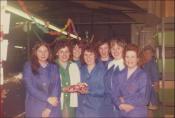
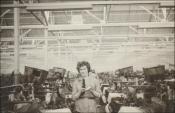
VSE025 Mair Richards, Forma, Merthyr;Kayser Bondor, Merthyr;Courtaulds, Merthyr;Chard's, London;AB Metals, Abercynon;Barton's, Merthyr
Mair left the grammar school because of her father’s ill-health, at 15½ and worked for W.H. Smiths before joining Kayser Bondor c.1952. Her mother was against her working in a factory. She describes the interview, the spotless factory – timing of toilet breaks; hand-cutting – shades and sizes of materials; producing bras and slips in huge orders; the importance of KB for Merthyr. In Dowlais (1960 onwards) they made silk stockings and other garments. She remembers raising money in the factory after the Aberfan disaster. She notes the Xmas celebrations; the rate of pay, unions, one strike for pay and how Courtaulds treated them. Accidents with the cutting knives. She didn’t like working at A.B. Metals – it was dirty and the girls were different. She returned to KB and when it closed she moved to Barton’s and then to Forma – supervising the cutting room. She finished in 1995.VSW025 Beryl Evans, Ina Bearings, Bynea
Beryl left school at 14, and worked in the Felin-foel brewery, 1941-8, before getting married. Her husband didn’t like women working in factories. Then she lost her husband and she had to go to work in INA Bearings to maintain the family. She was on inspection there. She talks about the factory nurse, the noise of the machines, clocking in, the children’s Christmas parties, getting a clock for long service and trips. She left the factory in 1982.Part of this interview is available as an audio file
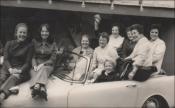
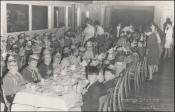

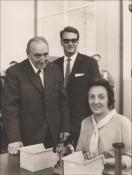
VN026 Blodwen Owen, Cookes Explosives, Penrhyndeudraeth
Blodwen worked in Cookes Explosive from soon after leaving school to when she retired in 1970. She had a five year gap when she had her children. The factory wasn't a comfortable place to work especially during the war, when they made hand grenades and the women's hands went yellow and there was an odor of TNT. It was a dangerous job. In describing the work, Blodwen said she had a stand and she had to push the powder inside the grenade. Other girls painted the outside, either green or red, and when they were dry, they were put into a holder to fill them with TNT. If they weren't filled properly they came back to be refilled. Blodwen always tried to do hers properly. She lost a sister, Elizabeth, in the big explosion of 1957, when four workers died in a explosion in one of the 'cwts'. Blodwen was on the works committee in the late 1960s. After working there for 25 years, the company presented her with a silver watch, which she still wears today. In the end, the doctor discovered that she suffered from 'NG Poisoning' and said she was not going back to work, she had to finish work on the same day. After that, she worked in a shop.



VSE026 Marjorie Collins, Hitachi, Hirwaun;Lines (Triang), Merthyr;General Electric Company, Merthyr
Her family background. Marjorie went to Technical college and left at 15 (1943) and worked in the Rediffusion office before going to Lines for three months before getting pregnant (1949). Dirty work but enjoyed company. Xmas fun. Returned there (1951). Welding and riveting toy push-chairs. Doing up their home. Told to take it easy in work – spoiling the rate for the men. Men teasing her. Factory (Triang) also made full size prams etc. Singing. Worked in a garage for years then. Then to GEC in Merthyr (?when she was 49 -1977) and then to spotlessly clean Hitachi factory, Hirwaun – full-time. In Merthyr making circuit boards – and likewise in Hitachi but also other jobs there. Japanese boys not allowed to fraternise with local workers. In the beginning Japanese said there were too many ‘white-heads’ there – then realised they were good workers. Younger workers spent time in toilets. Describes the solder bath at GEC. In those days if you didn’t work you were existing not living. She finished when she was 60 (1988).
VSW026 Eileen Davies, Slimma-Dewhirst, Llandovery
Eileen left school at 15 (1969) after doing her A Level in sewing and taught in night school etc, until she had her daughter and then she started in Slimma’s, Llandovery. The factory produced elasticated waist trousers for M&S. There were no cutters there and each one sewed a different part of the garment. Eileem feels that farm girls are used to hard work. They had detailed instructions (e.g. how many stitches an inch) from M&S. Eileen did some checking of goods, then became a floater. She wasn’t fast enough to be on the line. She also worked making jeans in the Lampeter factory. After leaving college she worked for a while in a small factory in Kenfig Hill making clothes from Welsh flannel. When checking in Slimma’s it was difficult to tell a worker to re-do the work. She became a supervisor. Dispute would arise when machines broke and the work was on stop. The girls had no ambition. Not a union member. The heaps of trousers absorbed the noise. Health and Safety – carrying heavy weight. Some of the girls went to the pub after pay on Fridays. They had a turkey each at Xmas. She left to get married.VN027 Beryl Jones, Cookes Explosives, Penrhyndeudraeth
Beryl worked in Cookes for four years, first in the printing room and then in the pay office as pay clerk. She knew people there before starting and said it was like being with a family, everyone knew each other, everyone was happy. She was not nervous because there hadn't been a recent explosion; she left before the big explosion in 1957. She met her husband there and married in 1954, leaving shortly afterwards when expecting her first child. Her husband was there for over 35 years, until the factory closed in the 1980s. Beryl left when she was expecting her first child. Her mother had two girls at home at the time so Beryl couldn't expect her to look after her child too. Beryl was quite happy to leave and at that time, that's what women did. After leaving Cookes, when her children were older, she worked in a fruit shop and after that in Bron Garth nursing home, where she stayed for 20 years until she retired to look after her grandchildrenVSE027 Barbara Morgan, Steinberg, Treforest
Barbara’s mother worked in Bridgend Munitions Works during the war (painting the ring around the bombs). Barbara herself left school at 14 (1946) and then went to work at Cheltenham College for boys. C. 1950 she went to Steinbergs where they made Alexon skirts and coats. Other girls helped her. Describes work. If fast and end product was passed you had ‘good money’ – piecework. The girls dressed smartly. She only had three sets of clothes – war coupons. They had to keep own machines clean. Lots of fluff. Plenty of jobs in factories at this time. Barbara quite liked the work but didn’t enjoy being shut in. Visited KLG factory – awful smell and working on asbestos. In Steinberg – needles through fingers. Music over tannoy and singing. Left and went to work in Malvern Girls’ College and has worked in shops and a school since. Factory gave her independence and was a learning curve. Only worked in Steinberg’s for a short while.VSW027 Joyce Evans, Anglo-Celtic Watch Co. (inc. Smith's Industries and Ingersoll aka 'Tick Tock'), Ystradgynlais
Joyce left school at 15 (1947) and started at Tick Tock (1947-1962) – then 9 years ‘out’ with the children and returned for 17 years (1971-88). It was difficult to get in there – you had to pull strings. Making coils for aeroplanes. When they started making watches she went on inspection on the Anglo site - a beautiful dust-proof building. In the beginning she was too frightened to go to the toilet. The boys in the automatic department used to whistle. In the dust-proof area – special rubber shoes and overalls. Making c.3000 watches a day (setting them by hand), and on to a further 7 regulation racks before ready. She was also a floater. When the Enfield clock factory opened she trained for the swing shift (4.30-9.30), mainly married women –friction with day shift, because they were hitting targets. Marriages announced in Tick Tock magazine. Her husband was a shop steward with AEU. Strict rules – Personnel Officer. Back injury – because of factory? When she got married in 1951 her colleagues gave her an Enfield clock. Dancing classes, dances and trips. The new young workers (1980s) had no respect and used bad language.

VN028 Vicky Perfect, Courtaulds, Flint
Vicky worked in Courtaulds from the age of 15, for 11 years. She would have liked to have stayed on at school and gone to college but her mother expected her to go out and work. She'd already been working in a cafe in Rhyl from the age of 13. She began factory work in Mayfair, which made duffle coats and was located on the top floor of Courtaulds but independent of it. It closed and was taken over by Courtaulds and the small workforce came too. Vicky was initally on the 'coning' and was later a union rep. She moved onto the staff at the age of 20, to the work study department. She can't remember what she earned when she was on the factory floor but in the work study department her wages were £23, in cash, and she gave the packet unopened to her mother, who would keep the £20 and give her £3, out of which she had to buy all her own clothes from her mother's catalogue. She still worked in the café at the weekends and bank holidays and the two week factory shutdown and she had to give this wage to her mother too, unopened. She liked working on the staff and did this job until she left to have her children in 1976.Part of this interview is available as an audio file


